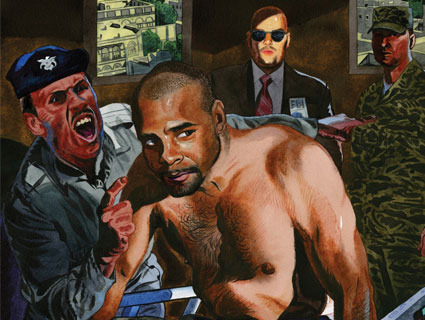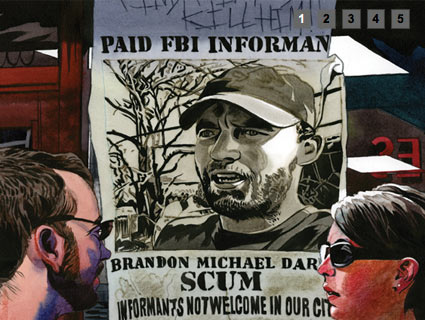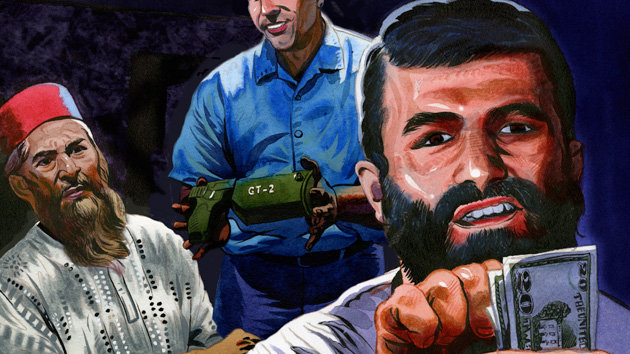|
1994 |
Shahed Hussain, whose family owns a chain of restaurants in Pakistan, is arrested in Karachi on a murder charge—trumped up, he says, for political reasons. His father bribes an officer to secure his release, and Hussain flees to the United States. |
|
1995–2000 |
Hussain works his way up from a $4 per hour job as a gas station attendant to owning a convenience store and a house in a middle-class suburb of Albany, New York. |
|
2000–01 |
Fluent in multiple languages, including Urdu and Dutch, Hussain takes a job as a DMV translator. He starts a side business helping DMV test takers cheat for $300 to $500 each. |
|
January 2002 |
Facing criminal charges and deportation after the DMV scam is busted, Hussain becomes an FBI informant. His first assignment: wearing a wire to gather evidence on 13 associates in the driver’s license scam. Some of the targets are his friends. |
|
2002 |
Hussain, who will later testify that his family has a long-standing friendship with former Pakistani prime minister Benazir Bhutto’s, brings his son to visit Bhutto in her hotel room at the Ritz-Carlton in New York. Bhutto asks the boy, “How old are you?” His answer: 17. “Let me buy you a car,” she replies, according to Hussain, and gives him $40,000 with instructions to purchase a Mercedes-Benz. |
|
August 2003 |
Hussain files for Chapter 13 bankruptcy, reporting nearly $180,000 in debts. He fails to tell the court of the Pakistani trust fund from which he will eventually withdraw $500,000. |
|
November 2003 |
Hussain meets with Mohammed M. Hossain, a Bangladeshi immigrant who owns a pizzeria in Albany. Following FBI instructions, Hussain brags about importing weapons for his “mujahid brothers” to use in the United States and shows off a Stinger missile “for destroying airplanes.” |
|
January 2004 |
Hussain gives the pizzeria owner $5,000 in cash. Yassin Aref, a local imam—and the FBI’s primary target in the sting—is brought in to oversee the transaction. “Let’s do some business, okay? Let’s make some money, okay?” Hussain says in a surveillance video. His FBI marching orders are to make it clear the money is being laundered for terrorists, but the pizzeria owner seems to think it’s just a loan: “I just need to keep going, just so I can pay the bills,” he says. Both he and Aref will be convicted of money laundering and material support and sentenced to 15 years in prison. |
|
2005 |
Hussain buys his son a new car; this time it’s an Audi. |
|
August 2006 |
After swearing to the bankruptcy court that he can’t afford to pay his debts, Hussain buys a run-down hotel in upstate New York and puts it in his wife’s name. Two years later, three guests sue Hussain for fraud after he takes prepaid reservations for rooms that are not actually available. |
|
2007–2008 |
Having “worked off” the DMV scam charges, Hussain becomes a paid FBI informant. He’s assigned to spend time in mosques in Newburgh, New York, and look for, in his words, “radicals”—a job that will make him nearly $100,000. |
|
October 2007 |
Hussain’s case is settled in bankruptcy court. He convinces the court he can’t start making payments on his remaining debts for four years. |
|
2008 |
Hussain befriends a Newburgh man named James Cromitie and takes him to an Islamic conference in Philadelphia, all expenses paid by the FBI. They end up talking about the Mumbai attacks, and Hussain points out that one of the gunmen’s targets was a Jewish community center. “I’d like to get one of those,” Cromitie responds. “I’d like to get a synagogue.” |
|
May 20, 2009 |
Hussain drives Cromitie and three other men to Riverdale, in the Bronx, where Cromitie places what he believes are bombs outside synagogues. They are arrested. |
|
September 21, 2010 |
Hussain testifies that he created the “impression” that Cromitie would make a lot of money for his role in the bombings. |
|
June 29, 2011 |
US District Judge Colleen McMahon sentences Cromitie to 25 years in prison but points out from the bench that the FBI played a key role. “It created acts of terrorism out of his fantasies of bravado and bigotry,” she says, “and then made those fantasies come true.” |
















